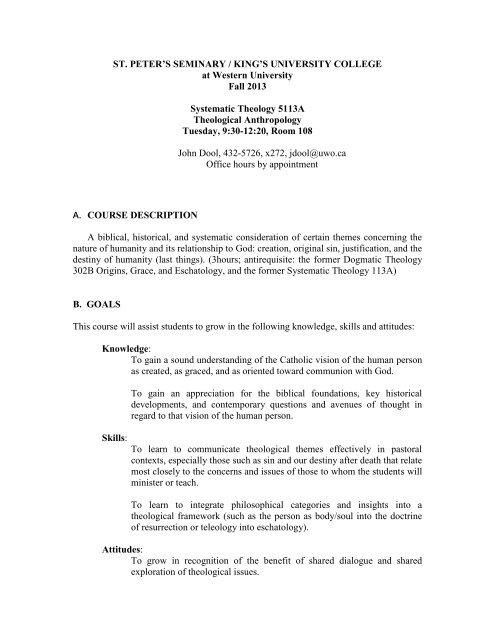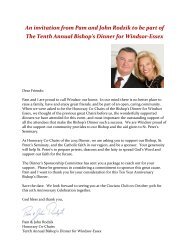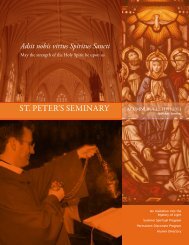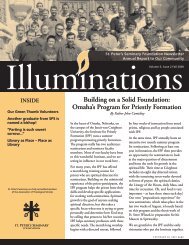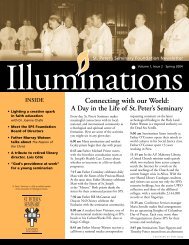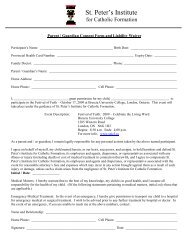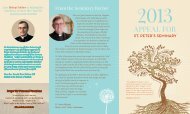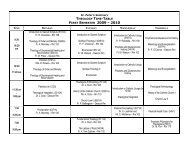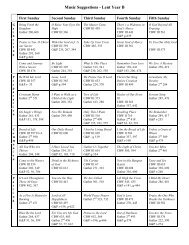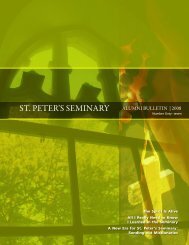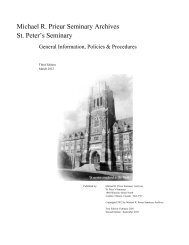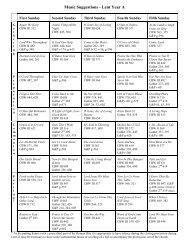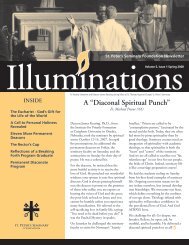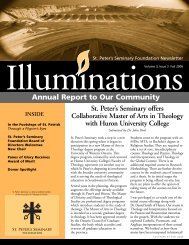Systematic Theology- 5113A - St. Peter's Seminary
Systematic Theology- 5113A - St. Peter's Seminary
Systematic Theology- 5113A - St. Peter's Seminary
You also want an ePaper? Increase the reach of your titles
YUMPU automatically turns print PDFs into web optimized ePapers that Google loves.
ST. PETER’S SEMINARY / KING’S UNIVERSITY COLLEGEat Western UniversityFall 2013<strong>Systematic</strong> <strong>Theology</strong> <strong>5113A</strong>Theological AnthropologyTuesday, 9:30-12:20, Room 108John Dool, 432-5726, x272, jdool@uwo.caOffice hours by appointmentA. COURSE DESCRIPTIONA biblical, historical, and systematic consideration of certain themes concerning thenature of humanity and its relationship to God: creation, original sin, justification, and thedestiny of humanity (last things). (3hours; antirequisite: the former Dogmatic <strong>Theology</strong>302B Origins, Grace, and Eschatology, and the former <strong>Systematic</strong> <strong>Theology</strong> 113A)B. GOALSThis course will assist students to grow in the following knowledge, skills and attitudes:Knowledge:To gain a sound understanding of the Catholic vision of the human personas created, as graced, and as oriented toward communion with God.Skills:To gain an appreciation for the biblical foundations, key historicaldevelopments, and contemporary questions and avenues of thought inregard to that vision of the human person.To learn to communicate theological themes effectively in pastoralcontexts, especially those such as sin and our destiny after death that relatemost closely to the concerns and issues of those to whom the students willminister or teach.To learn to integrate philosophical categories and insights into atheological framework (such as the person as body/soul into the doctrineof resurrection or teleology into eschatology).Attitudes:To grow in recognition of the benefit of shared dialogue and sharedexploration of theological issues.
2To value one’s own unique manifestation of humanity in its openness tograce and to value that unique manifestation of humanity in others.C. ASSESSMENTEssay proposal and outline (2-3 pages) and annotated bibliography, due Oct. 15(10%)A research paper, (10-12 pages, 12 pages maximum) on a topic of your selection;due Nov. 19 (40%)A final, written examination will be during the exam period (30%)Participation in discussions. Each class students will submit a written comment orquestion (one paragraph) based on the week’s readings (20%).D. READINGS OR TEXTBOOKSRequired:Coursepack; available at UWO bookstore; online documents as notedRecommended:Haight, Roger. The Experience and Language of Grace. New York:Paulist Press, 1979; available at UWO bookstoreE. STRUCTURE OF THE COURSESection 1: Creation and SinWeek 1 (Sept. 10): Introduction; Background to <strong>Theology</strong> of Creation; Creation in Scripture(Genesis 1-3)Week 2 (Sept. 17): Creation in Tradition (Neil Ormerod, “The God of Creation”, Creation, Grace,and Redemption, Orbis Books, 2007, pp.1-22. The Human Creature as Imago Dei (International Theological Commission,Communion and <strong>St</strong>ewardship: Human Persons Created in the Image of God,sections 1-31; not in coursepack; available online at www.vatican.va)
3Week 3 (Sept. 24): Created for Communion (Communion and <strong>St</strong>ewardship, sections 32-55) <strong>St</strong>ewards of Creation (Communion and <strong>St</strong>ewardship, sections 56-80)Week 4 (Oct. 1): Sin: Original and Personal (Michael Schmaus, "Original Sin", Dogma 2: Godand Creation, pp.172-203; Joseph Ratzinger, "Sin and Salvation", In theBeginning, pp.61-77) Social Sin (Michael Sievernich, “Social Sin and Its Acknowledgement”,Concilium: The Fate of Confession, [Edinburgh, 1987], pp.53-63)Section 2: GraceWeek 5 (Oct. 8): Introduction to Grace (Haight, ch. 1) The Pauline Vision (Romans 1-8; Philippians, 1-4; Ephesians 1-2; ElizabethDreyer, "New Creation in Christ: Paul of Tarsus", Manifestations of Grace,[Wilmington, Delaware, 1990], pp.54-64) Patristic ThemesWeek 6 (Oct. 15): Augustine (“Dimensions of Grace”, from The Essential Augustine, VernonBourke, ed., [Toronto, New American Library of Canada. 1964], pp.175-89;Haight, ch.2) From Augustine to AquinasWeek 7 (Oct. 22): Thomas Aquinas (Aquinas, Summa Theologica, [New York, BenzigerBrothers, 1947], I-II, q.110, aa.1-4; q.111, aa.1-3; Haight, ch.3) From Aquinas to LutherWeek 8 (Oct. 29): Martin Luther (Luther, “A Commentary on <strong>St</strong>. Paul’s Epistle to theGalatians”, Martin Luther: Selections from His Writings, John Dillenberger,ed. [New York, Doubleday, 1961], pp.99-109; Haight, ch.4) Trent (Haight, ch. 5)Week 9 (Nov. 5): The Issue of Grace Among Christians Today (The Lutheran/Roman CatholicJoint Declaration on Justification; not in coursepack; online atwww.vatican.va) From Trent to Rahner
4Week 10 (Nov. 12): Rahner (Haight, ch.6, Rahner, “Relationship Between Nature and Grace: theSupernatural Existential” A Rahner Reader, Gerald McCool ed., [New York,Crossroad, 1981], pp.185-90) From Grace to EschatologySection 3: EschatologyWeek 11 (Nov. 19): The Eschatological Virtue of Hope (Jurgen Moltmann, “Introduction:Meditation on Hope”, A <strong>Theology</strong> of Hope, [New York, 1967], pp.15-36) Death and Resurrection (1 Cor 15; Zachary Hayes, “Eschatology andIndividual Destiny”, Visions of a Future, [Wilmington, Delaware, MichaelGlazier, 1989], pp.96-111; Anthony Kelly, “Eternal Life: LoveConsummated”, God is Love, [Collegeville, MN: Liturgical Press, 2012],pp.95-109)Week 12 (Nov. 26): The Parousia and the Final Fulfillment (Joseph Ratzinger, Eschatology,[Washington: Catholic University of America Press, 1988] pp.194-214) Heaven (Ratzinger, pp. 233-238)Week 13 (Dec. 3): Hell and Purgatory (Ratzinger, pp. 215-33)F. UNIVERSITY REGULATIONS<strong>St</strong>udents are responsible for knowing the University’s academic policies andregulations and any particularities of their own course of study. These can all be found atthe University’s website (http://www.uwo.ca/univsec/handbook/appeals/scholoff.pdf).Ignorance of these policies is not an excuse for any violation thereof. The followingpolicies are particularly important to note:Submission of Assignments and Tests: Assignments are due at the beginning ofclass on the dates as given above. Assignments may not be dropped off at King’sor submitted electronically.It is the responsibility of the student to organize his or her work so that theassignments are completed on time. For a serious reason, a student may approachthe professor before the due-date, and may be granted an extension at thediscretion of the professor. Any medical reasons will be confirmed by proper
5documentation as approved by the Dean’s Office. A penalty of 10% of the valueof the assignment will be deducted for each day it is overdue without permission.No electronic devices will be allowed during tests or the examination, unlessapproved in advance by <strong>St</strong>udent Services at the University or King’s.<strong>St</strong>udents who miss tests will negotiate a “make-up” date with the professor. Anymedical reasons will be confirmed by proper documentation as approved by theDean’s Office.Plagiarism: <strong>St</strong>udents must write their essays and assignments in their own words.Whenever students take an idea or a passage from another author, they mustacknowledge their debt by quotation marks and/or footnotes. Plagiarism is amajor academic offense. <strong>St</strong>udents may be required to submit their work inelectronic form for plagiarism checking.Selection and Registration of Courses: <strong>St</strong>udents are responsible for ensuringthat their selection of courses is appropriate and accurately recorded, that allprerequisite course(s) have been successfully completed, and that they are awareof any anti-requisite course(s) that they have taken.BIBLIOGRAPHYAnderson, Carl and Granados, Jose. Called to Love: Approaching John Paul II’s<strong>Theology</strong> of the Body. New York: Doubleday, 2009.Auer, Johann and Ratzinger, Joseph. Dogmatic <strong>Theology</strong>, vol.9: Eschatology.Washington: Catholic University of America Press, 1988.Barbour, Ian. Nature, Human Nature, and God. Minneapolis: Fortress Press, 2002.Barnard, Justin D. “Purgatory and the Dilemma of Sanctification”, Faith andPhilosophy, v.24, no.3, 2007, pp. 311-30.Beilby, James K. and Eddy, Paul Rhodes, eds. Justification: Five Views. DownersGrove, IL: IVP Academic, 2011.Bergmann, Sigurd. Creation Set Free: The Spirit as Liberator of Nature. Grand Rapids,MI: Eerdmans, 2005.Boland, Vivian. “Where to for Limbo”, Doctrine and Life, v.57, no.7, 2007, pp. 17-29.Bouteneff, Peter. C. Beginnings: Ancient Christian Readings of the Biblical CreationNarratives. Grand rapids, MI: Baker Academic, 2008.
6Bransfield, J. Brian. The Human Person: According to John Paul II. Boston: PaulineBooks and Media, 2010.Burns, J. Patout. Theological Anthropology (Sources of Early Christian <strong>Theology</strong>).Philadelphia: Fortress Press, 1981.Carroll, William E. “Creation and Science in the Middle Ages”, New Blackfriars, v.6,no.1, 2007, pp.678-89.Casey, Thomas G. Life and Soul: New Light on a Sublime Mystery. Springfield, Ill.:Templegate, 2005.Charlton, William. “The Doctrine of Creation”, The Heythrop Journal, v.XLIX, no.4,July, 2008, pp.620-31.Clark-Soles, Jaime. Death and the Afterlife in the New Testament. New York: T&TClark, 2006.Clement, Olivier. On Human Being: A Spiritual Anthropology. New York: New CityPress, 200.Daly, Cahal. The Minding of Planet Earth. Dublin: Veritas, 2005.Daly, Gabriel. Creation and Redemption. Wilmington, Del.: Michael Glazier, 1989.Dreyer, Elizabeth. Manifestations of Grace. Wilmington, Del.: Michael Glazier, 1990.Drummond, Celia Deane. Eco-<strong>Theology</strong>. Winona, MN: Anselm Academic, 2008.Duffy, <strong>St</strong>ephen. The Dynamics of Grace: Perspectives in Theological Anthropology.Collegeville, MN: Liturgical Press, 1993.The Graced Horizon: Nature and Grace in Modern Catholic <strong>Theology</strong>.Collegeville, MN: Liturgical Press, 1992.Edwards, Denis. How God Acts: Creation, Redemption, and Special Divine Action.Minneapolis: Fortress Press, 2010.Fernandez, Eleazar S. Reimagining the Human: Theological Anthropology in Responseto Systemic Evil. <strong>St</strong>. Louis: Chalice Press, 2004.Gaffney, James. Sin Reconsidered. New York: Paulist Press,1983.Gaine, Simon Francis. Will There Be Free Will in Heaven? Freedom, Impeccability, andBeatitude. London: T&T Clark, 2003.
7Galvin, John, ed. Faith and the Future: <strong>St</strong>udies in Christian Eschatology. New York:Paulist Press, 1994.Garcia-Riviera, Alejandro. Garden of God: A Theological Cosmology. Minneapolis:Fortress Press, 2009.Gelpi, Donald. The Gracing of Human Experience: Rethinking the Relationship BetweenNature and Grace. Collegeville, MN: Liturgical Press, 2001.George, Marie I. “Aquinas on the Goodness of Creatures and Man’s Place in theUniverse: A Basis for the General Precepts of Environmental Ethics”, TheThomist, v.76, no.1, 2012, pp. 73-124.Gilkey, Langdon. Maker of Heaven and Earth. New York: Anchor Books, 1965.Gonzales, Michelle A. Created in God’s Image: An Introduction to FeministTheological Anthropology. Maryknoll, NY: Orbis Books, 2007.Granados, Jose. “Embodied Light, Incarnate Image: The Mystery of JesusTransfigured”, Communio, v.35, no.1, Spring 2008, pp. 6-45.Grumett, David. “Eucharist, Matter and the Supernatural: Why de Lubac NeedsTeilhard”, International Journal of <strong>Systematic</strong> <strong>Theology</strong>, v.10, no.2, 2008, pp.165-78.Hardon, John A. History and <strong>Theology</strong> of Grace: The Catholic Teaching on DivineGrace. Ypsilanti, MI: Veritas Press of Ave Maria College, 2002.Harrison, Nonna Verna. God’s Many Splendored Image: Theological Anthropology forChristian Formation. Grand Rapids, MI: Baker Academic, 20210.Hayes, Zachary. Gift of Being: A <strong>Theology</strong> of Creation. Collegeville, MN: LiturgicalPress, 2001.Visions of a Future. Wilmington, Delaware: Michael Glazier, 1989What Are They Saying About Creation? New York: Paulist Press, 1980.What Are They Saying About the End of the World? New York: Paulist Press,1983.A Window to the Divine: A <strong>St</strong>udy of Christian <strong>Theology</strong> of Creation. Quincy, IL:Franciscan Press, 1997.Healy, Nicholas, J. The Eschatology of Hans Urs von Balthasar: Being as
8Communication. Oxford: OUP, 2005.Henry, Martin. “Reflections on Grace (1)”, Irish Theological Quarterly, v.66, no.3,Autumn, 2001.“Reflections on Grace (2)”, Irish Theological Quarterly, v.66, no.4, Winter, 2001.Henz, Otto. The Hope of the Christian. Collegeville, MN: Liturgical Press, 1997.Husbands, Mark, and Treier, Danieal J. eds. Justification: What’s at <strong>St</strong>ake in the CurrentDebates. Downers Grove, Ill: InterVarsity Press, 2004.Karkkainen, Veli-Matti. One with God: Salvation as Deification and Justification.Collegeville, MN: Liturgical Press, 2004.Kelly, Anthony. Eschatology and Hope. Maryknoll, NY: Orbis Books, 2006.Kelsey, David H. Eccentric Existence: A Theological Anthropology. Louisville: JohnKnox Press, 2009.Kharlamov, Vladimir. “Theosis in Patristic Thought”, <strong>Theology</strong> Today, v.65, no.2, 2008,pp. 158-68.King, Peter. “Damaged Goods: Human Nature and Original Sin”, Faith and Philosophy,v.24, no.3, 2007, pp. 247-67.LaDue, William. The Trinity Guide to Eschatology. New York: Continuum Press, 2004.Lane, Dermot. Keeping Hope Alive: <strong>St</strong>irrings in Christian <strong>Theology</strong>. New York: PaulistPress, 1996.Laporte, Jean-Marc. Patience and Power: Grace for the First World. New York: PaulistPress, 1988.Luthes Biviano, Erin. The Paradox of Christian Sacrifice: The Loss of Self, the Gift ofSelf. New York: Herder and Herder, 2007.Macquarrie, John. Christian Hope. New York: Seabury Press, 1978.Martin, Regis. The Last Things. San Francisco: Ignatius Press, 1998.McDermott, Brian. What Are They Saying About the Grace of Christ? New York: PaulistPress, 1984.McMullin, Ernan, ed. Evolution and Creation. Notre Dame, Ind.: University of NotreDame Press, 1985.
9Moloney, Raymond. “De Lubac and Lonergan on the Supernatural”, Theological<strong>St</strong>udies, v.69, no.3, 2008, pp.509-27.Moltmann, Jurgen. <strong>Theology</strong> of Hope. New York: Harper and Row, 1967.O’Callaghan, Paul. Christ our Hope: An Introduction to Eschatology. Washington:Catholic U. of America Press, 2011.O’Keefe, Mark. What Are They Saying About Social Sin? New York: Paulist Press,1990.Olson, Roger E. “Deification in Contemporary <strong>Theology</strong>”, <strong>Theology</strong> Today, v.64, no.2,2007, pp. 186-200.Ormerod, Neil. Creation, Grace, and Redemption. Maryknoll, NY: Orbis Books, 2007.Peters, Tiemo Rainer, and Urban, Claus, eds. The End of Time? The Provocation ofTalking About God. New York: Paulist Press, 2004.Phan, Peter C. Responses to 101 Questions on Death and Eternal Life. New York:Paulist Press, 1997.Prokes, Mary Timothy. Toward a <strong>Theology</strong> of the Body. Grand Rapids, MI: Eerdmans,1996.Rahner, Karl. A Rahner Reader. New York: Crossroad, 1981.Ratzinger, Joseph. 'In the Beginning': A Catholic Understanding of the <strong>St</strong>ory ofCreation and the Fall. Grand Rapids MI: Eerdmans, 1995.Riches, Aaron. “Deconstructing the Linearity of Grace: The Risk and Reflexive Paradoxof Mary’s Immaculate Fiat”, International Journal of <strong>Systematic</strong> <strong>Theology</strong>, v.10,no.2, 2008, pp. 179-94.Rondet, Henri. Original Sin: The Patristic and Theological Background. New York:Alba House, 1972.Russell, Norman. The Doctrine of Deification in the Greek Patristic Tradition. Oxford:OUP, 2004.Sachs, John R. The Christian Vision of Humanity: Basic Christian Anthropology.Collegeville, MN: Liturgical Press, 1991.Schmaus, Michael. Dogma, vols. 2 & 6. Kansas City: Sheed and Ward, 1977.
10Siewerth, Gustav. “Original Sin and Concupiscence”, Communio, v.27, Spring 2000,pp.46-57.Tavard, George. From Bonaventure to the Reformers. Milwaukee: Marquette UniversityPress, 2005.Theisen, Jerome. Community and Disunity: Symbols of Grace and Sin. Collegeville,MN: <strong>St</strong>. John's University Press, 1985.Timpe, Kevin. “Grace and Controlling What We Do Not Cause”, Faith and Philosophy,v.24, no.3, 2007, pp. 284-99.Vander Laan, David. “The Sanctification Argument for Purgatory”, Faith andPhilosophy, v.24, no.3, 2007, pp. 331-39.Viladesau, Richard. The Reason for our Hope: An Introduction to ChristianAnthropology. New York: Paulist Press, 1984.“Theosis and Beauty”, <strong>Theology</strong> Today, v.65, no.2, 2008, pp.180-90.Volf, Miroslav. The Future of Hope: Christian Tradition amid Modernity andPostmodernity. Grand Rapids MI: Eerdmans, 2004.Walls, Jerry L. Heaven: The Logic of Eternal Joy. Oxford: OUP, 2002.Purgatory: The Logic of Total Transformation. Oxford: OUP, 2011.West, Christopher. <strong>Theology</strong> of the Body Explained. Boston: Pauline Books, 2003.Zizlioulas, John D. Being as Communion: <strong>St</strong>udies in Personhood and the Church.Crestwood, NY: <strong>St</strong>. Vladimir’s <strong>Seminary</strong> Press, 1985.OUTLINE INFORMATIONThe purpose of the outline is to get you thinking about a topic early in thesemester and to begin planning how you will approach that topic. A good outlineprovides not only general headings but articulates specific sub-topics. You shouldprovide a structure for the paper as a whole and a structure for each part of the paper.This will help you to think through what you want to present and how you want topresent it. What is your central question/thesis? What background do you need topresent it? What key themes or points do you want to develop? In what order will youpresent them? The greater detail in which you can outline this, the better your finalproduct will be.As a first outline, this will be provisional. Some elements of it may change as you
11do further reading and as you begin to write. While you will hand the outline in withyour final paper, there is no penalty for making these kinds of changes – that is part of theprocess.Another part of the assignment is producing an initial bibliography. Here again,this will likely change to some degree as the project develops. An annotatedbibliography is one that gives a brief description of the contents and approach of eachwork cited. Here is an example:Kelly, Anthony. Eschatology and Hope. Maryknoll, NY: Orbis Books, 2006.Kelly looks at traditional topics of the “last things” – death, heaven, hell, andpurgatory – but within the context of a well-developed theology of hope. Heintegrates scriptural and traditional perspectives with contemporary questions andperspectives within each theme.RESEARCH ESSAY INFORMATIONPICKING A TOPICThe first task of writing an essay is picking a topic. It is best to think in terms of aquestion you have or an issue you want to explore rather than a topic that you think ismanageable. You will write a better essay if you care about the subject matter. Since theassignment is fairly concise you need to keep your focus narrow. As you read and thinkabout the area in which you are interested, always think about narrowing it down. Forexample, you do not want to write an essay about grace in Augustine's thought; that is abook-length topic. Instead, you might want to write on the distinction between freedomand free will in Augustine, how the two creation stories in Genesis differ and arecomplementary, Karl Rahner's understanding of the universal character of grace, and soon. This process of refining and focusing your issue needs to be done in the first stages.The aim should always be depth rather than breadth - saying something incisive about awell defined issue rather than covering a lot of ground superficially. Remember that youdo not have to include everything you learn in the course of your research in the finaldraft. Writing the essay should be an opportunity to learn; the final product is just theend result of a larger process of investigation.PARTS OF THE ESSAYSYour essay should have two main parts. You have picked a manageable, tightlydefined topic. You now want to examine the texts that are central to your topic, as wellas using other sources to provide background and context. The first part of your paper
12will present the results of your research and analysis of the text. (You must footnoteeverything you borrow either from your primary or secondary sources, using the MLAstyle). You should do more than summarize what you have read; you should analyse thetext or texts in order to convey the authors' meaning, the points that they are trying to getacross to their readers. What are they saying and how are they saying it? What is thesubstance and form of their argument or point of view? A good way to show that youunderstand the writer's views (as opposed to just repeating them) is to come up withexamples of your own to illustrate his or her points.The second part of the assignment is evaluative. This part is ordinarily shorterthan the first, but even more crucial. In the first part, you examined what selectedChristian writers, scholars, and theologians have to say about your question or issue. Thesecond part is the place where you say what you think about it. You will reflect on andevaluate what you have discovered in the course of your research. Do you agree ordisagree with the authors you have been examining? Why? What are the strengths andweaknesses of their views? If the authors you have read disagree amongst themselves,whose views do you find most convincing? Why? If you have been focusing on oneauthor in particular and you largely agree with him or her, what are the kinds ofobjections others might raise against him or her, and how would you defend your adoptedposition? If you are investigating a biblical or historical issue, how is it applicable to thecontemporary situation and contemporary faith? What further issues does your researchraise for you, or how does it connect to other theological issues?These are only examples of the kinds of approaches you might take to this part ofthe paper. It is an opportunity for you to be creative. Your reflection will be bothpersonal and scholarly. It will be personal in the sense that it represents what you thinkon the matter at hand. It will be scholarly in that you will support what you think byrational argumentation. You may or may not want to make reference to your ownexperience in this section. Your personal experience is relevant insofar as it illustratesand illuminates the issue. You want to avoid two extremes: on the one hand, relatingpersonal experiences for their own sake; on the other hand, simply lining up the views ofothers without appropriating the issue for yourself and making a judgment about it,however preliminary or limited that judgment may be. The key is to show your readerthat you have been thinking about the question and can say something about it in yourown voice. This is more difficult to do in most cases than the research, because you haveto grapple with the issue yourself and commit yourself to some judgments about it. Themore you do so and the more deeply you explore and unpack your ideas, the betterchance you have of writing a good reflection section. This part of the paper is crucial inthe evaluation process.RESEARCHING THE ESSAYYou will likely have done some preliminary reading in order to have picked atopic. Now you want to investigate this topic more thoroughly. You may want to beginwith encyclopedia articles and textbooks to get an overview. Often these will provide
13you with a bibliography, giving you further sources to consult. You can consult books,collections of essays, and articles in scholarly journals. If you are researching a primarytext (for example, Paul’s Letter to the Romans or Trent’s Decree on Justification) youwill want to study the text itself carefully; you will also want to consult secondarysources, the works of scholars and commentators who have studied that text or theparticular issue you are examining.For a research paper of this size your bibliography should contain approximatelysix to ten sources. Internet sources are acceptable, but be aware of that fact that anybodycan put anything on a web site; it does not have the advantage of being screened forpublication. I encourage you to rely on the library rather than the internet. Takeadvantage of the fact that the library here is an excellent theological library with a staffwho know a lot about researching in the area of theology.WRITING THE ESSAYAfter you have done the bulk of your research and collected your notes, the singlemost important thing you can do to write an effective essay is to create a detailed outlinebefore you start writing. By this I do not mean a one paragraph sketch of two or threepoints you want to cover in the whole essay. For a paper of this size an outline of severalpages, with a paragraph by paragraph working out of your ideas is in order. This is thecrucial stage of writing a paper. You should do your thinking and work out your ideasbefore you actually start to compose your essay. Then, the writing will be simply amatter of expressing and revising what you have already understood and formulated.This helps you both to organize and clarify your line of thought (in the construction of theoutline) and to focus on the best way of expressing your ideas (in the actual compositionof the essay).A final word about grammar and style: the ability to express your thoughts withclarity is crucial. Grammar and style are the vehicles of content. You can have brilliantideas, but if you cannot express them clearly, they will be lost on your reader. Marks willbe deducted to the extent that your writing hinders clarity of communication. Do not hurtyourself through careless or ineffective writing.


